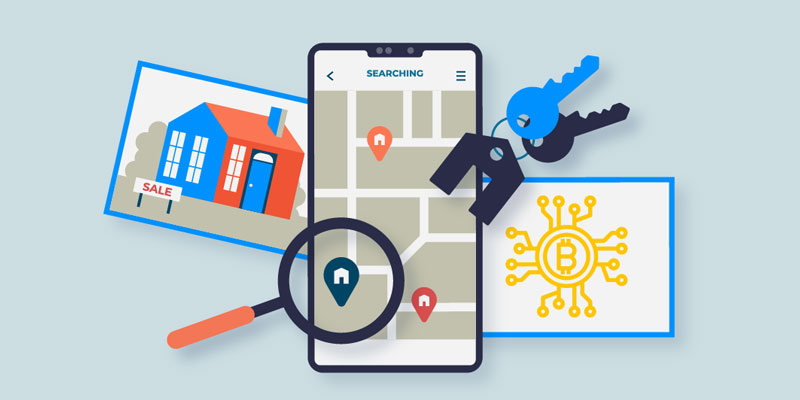Let's Connect fastest growing future tech web 3.0 blockchain group to connect & share with same minded people
How blockchain technology can change the real estate sector | Blockchain in Real Estate
 Blockchain
Blockchain
The real estate sector holds the paramount portion of the nation’s economy. Now blockchain is not limited to powering
bitcoin only. Gradually it has improved its implications in various sectors. The real estate documentation process
is
digitized. But there is a lack of proper holder technology which binds all the crucial data together with security.
Blockchain can bring revolution in commercial real estate (CRE). All the major tasks like buying and selling of
properties, leveraging, loans, investing, leasing can be properly digitized on a blockchain platform. Shortly, we
will
adopt blockchain for public utility services like assignments to parking, water, power consumption and data derived
city
management.
When talking about the application of blockchain, it may not be efficient in certain parameters but it depends on the
companies and their operational functions. Certain real estate companies have already adopted this technology to
manage
data ledgers digitally and it helps them a lot in saving time and cost.
Now, let’s dive into How blockchain can change the Real estate sector.
- Common database
- Trust builder
- Opportunity for small companies
- Smart contacts execution
- Diminishes fraud
- Property search
- Property deal
- Accuracy in due diligence
- Easy Cash flows management
- Optimum data quality
Blockchain can bring a common database for all the associated real estate identities like brokers, tenants,
owners, buyers, sellers, builders, investors and all can find the relevant data as per their requirements.
It holds a distributed ledger where all the transaction data are visible to all members.
No need to give proof and verify the documents. The ledger record itself is proof.
Blockchain will improve the transparency between the buyer and the seller. The price quotes are visible to all.
Many discrepancies are prevailing in the interest rates of the loans which are revoked completely by blockchain.
Real estate is an altogether worthy sector in terms of finance. Small companies with minimum investment can enter
into the system. Slowly and gradually they will find opportunities to put forth their projects due to the
in-discriminative model of blockchain.
Some real estate contacts are divided into a few parts. For example, for a 1 crore property 5 divisions of 20
lakhs each. Here, smart contact can be placed as every month 1 contact is executed. So, it will automatically
execute the contract for 5 months. This is the simple form of understanding smart contracts in real estate.
Some complex smart contracts are based on conditions and algorithms. The smart contract enables high security and
surety of performing the contract in future.
Moreover, the owner of the property can place the contract like after paying the specific price the ownership
title would be delivered. So, clarification for both the parties on a secured blockchain platform.
Many giant historical frauds have occurred in the real estate sector. A big scandal like assigning one property
to two different parties at the same time. Blockchain can mitigate this kind of fraudulent activity. It clearly
shows the buyers name, sellers name, property name and other details of the transaction to all.
Users can search for the specific record and get the details of the desired property. It makes the searching
tasks for an ideal property easy. Moreover, the broker, the lessor or the lessee can furnish the specific
requirements related to the property so it makes it simple to list down a few suitable properties.
You may wonder how blockchain-enabled property deals? Yes, it does. The respective broker will list the details
of the property. Now the researcher will search for the property as per their requirements and they will find
the owner through a broker. And
They can schedule a meeting for a negotiation. The owner will issue a letter of intent and the intended buyer
authorized it. Besides, they can exchange payments through smart identities and smart contracts.
CRE benefited from the digital identities for property dealing. It shows the legitimacy of the buyer and verifies
all the identity proofs. From a financial perspective, it makes the Lending process easy like obtaining a loan
from the financial institution, checking the eligibility for loan approval. These tasks can take a longer
duration in a physical appearance but due to blockchain, they can be accomplished in a few minutes by just
checking the records.
With the existing scenario, the CRE sector is dealing with lots of complex cash flow structures. There are
multiple payment options from different identities and in different portions while some bonds are based on the
limited time frame and previous contract execution. The blockchain model simplifies the payment and cash flow
structure. Digital identity verification and a transparent single decentralised structure enable easy and
cheaper cash flow management.
This can be considered a major opportunity for CRE companies and technology. Blockchain enhances data quality,
real-time recordings and retrieval. As a result of CRE, companies can utilize data and predict smart industry
insights and decisions. Blockchain is a data recording ledger so, mining the data, analyzing the data and then
optimum utilization of the data is easily managed.
Take Home Message
Blockchain enables the smooth functioning of the real estate sector in various forms listed above. Though it is not
fully accepted technology, it has the potential to bring many basic changes which simplify real estate troubles. Now
the real estate company’s owner has to decide where to apply this technology and how it can help them.
For any further queries and implementing blockchain in real estate structure contact us.
Author Name : Kiran Sagar





